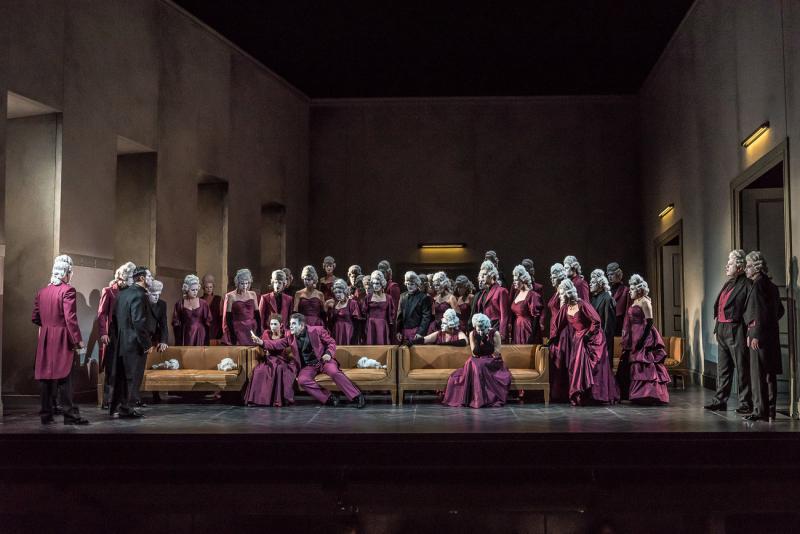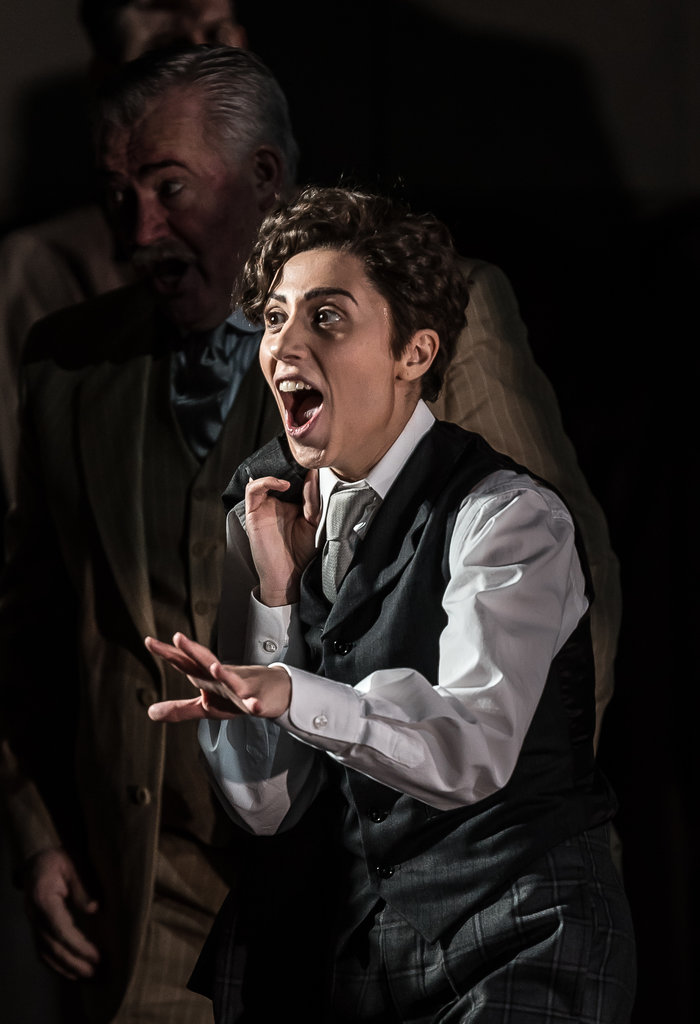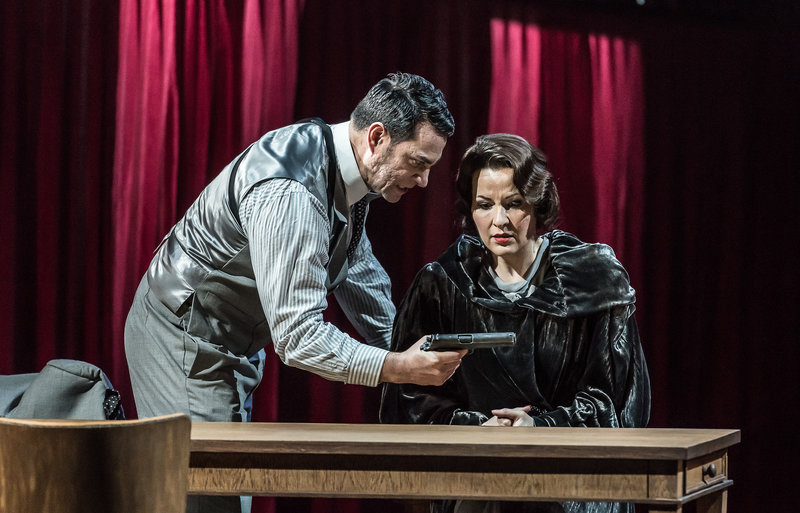Un ballo in maschera, Opera North review - decent, no more | reviews, news & interviews
Un ballo in maschera, Opera North review - decent, no more
Un ballo in maschera, Opera North review - decent, no more
Dramatically muddled, musically satisfying account of a Verdi masterpiece

You’d expect a degree of mischief and bafflement in an opera about mistaken identity, closing with a scene set at a masked ball. But Tim Albery’s new Opera North Un ballo in maschera is confusing for the wrong reasons, its shortcomings all the more irritating compared how good the performance actually sounds.
Designer Hannah Clark’s dour colour scheme is pure Scandi-noir, though the grey suits worn by the chorus in the opening scene make it difficult to discern who’s who and who’s singing what. Rafael Rojas’s King Gustavo could be just another bloke in a nicely cut suit. He's more stressed-out senior manager than commanding head of state, complete with a capable PA in the form of a scene-stealing Tereza Gevorgyan as Oscar (pictured below). Rojas sings beautifully, if a little harshly at times, but he's a tad too sympathetic: we don't understand why he's so despised by those plotting against him.
 Still, Antonio Somma’s lucid libretto and some of Verdi’s most viscerally entertaining music make the production whizz by, despite the incongruities piling up. Patricia Bardon’s commanding clairvoyant Ulrica is excellent, though why she’s dressed up to resemble Marlene Dietrich, holding court in what looks like the Black Lodge from David Lynch’s Twin Peaks, is left unexplained. Still, seeing the red drapes slowly rise is a visual treat, and it’s fun to watch Rojas disguised as a sea captain. As you’d expect, the forecast is stormy, Ulrica predicting that Gustavo will be killed by the next person to shake his hand. Inevitably, this turns out to be his best friend and advisor Anckarström, sympathetically portrayed by a fresh-voiced Philip Rhodes.
Still, Antonio Somma’s lucid libretto and some of Verdi’s most viscerally entertaining music make the production whizz by, despite the incongruities piling up. Patricia Bardon’s commanding clairvoyant Ulrica is excellent, though why she’s dressed up to resemble Marlene Dietrich, holding court in what looks like the Black Lodge from David Lynch’s Twin Peaks, is left unexplained. Still, seeing the red drapes slowly rise is a visual treat, and it’s fun to watch Rojas disguised as a sea captain. As you’d expect, the forecast is stormy, Ulrica predicting that Gustavo will be killed by the next person to shake his hand. Inevitably, this turns out to be his best friend and advisor Anckarström, sympathetically portrayed by a fresh-voiced Philip Rhodes.
The most arresting singing comes from the Hungarian soprano Adrienn Miksch (pictured below with Rhodes) as Anckarström’s wife Amelia: her extended love scene with Gustavo at the start of Act II is riveting, her high pianissimo notes perched on the very edge of audibility. Glorious playing too from the company’s former music director Richard Farnes’s orchestra, the weeping cor anglais solo matching Miksch note for note.  Farnes’s dynamic control is his greatest asset: he revels in Verdi’s quirky details and never lets the orchestra overwhelm his voices. The fortissimo chord which erupts when Gustavo and Amelia declare their love is overwhelming. They make a credible couple, his bluff, no-nonsense manner matched by her refinement. Miksch is especially good near the opening of the final act, accepting her husband’s brutal demands with heartbreaking stoicism.
Farnes’s dynamic control is his greatest asset: he revels in Verdi’s quirky details and never lets the orchestra overwhelm his voices. The fortissimo chord which erupts when Gustavo and Amelia declare their love is overwhelming. They make a credible couple, his bluff, no-nonsense manner matched by her refinement. Miksch is especially good near the opening of the final act, accepting her husband’s brutal demands with heartbreaking stoicism.
The titular masked ball is unseen; instead, we see the guests catching their breath between dances. Having the entire cast bewigged in whiteface makeup is disconcerting, as if we’ve suddenly leapt back 200 years. Trying to spot Gustavo and Anckarström is like playing a live action version of Where’s Wally? And why is Gevorgyan’s Oscar now a young girl in a ball gown? I was baffled. Happily, outstanding chorus work and Farnes’s electrifying conducting save the day: the bleak close packs a mighty punch and we’re left wanting more. Decent, but not quite decent enough, especially given Albery’s excellent track record with this company.
rating
Explore topics
Share this article
The future of Arts Journalism
You can stop theartsdesk.com closing!
We urgently need financing to survive. Our fundraising drive has thus far raised £49,000 but we need to reach £100,000 or we will be forced to close. Please contribute here: https://gofund.me/c3f6033d
And if you can forward this information to anyone who might assist, we’d be grateful.

Subscribe to theartsdesk.com
Thank you for continuing to read our work on theartsdesk.com. For unlimited access to every article in its entirety, including our archive of more than 15,000 pieces, we're asking for £5 per month or £40 per year. We feel it's a very good deal, and hope you do too.
To take a subscription now simply click here.
And if you're looking for that extra gift for a friend or family member, why not treat them to a theartsdesk.com gift subscription?
more Opera
 Carmen, English National Opera review - not quite dangerous
Hopes for Niamh O’Sullivan only partly fulfilled, though much good singing throughout
Carmen, English National Opera review - not quite dangerous
Hopes for Niamh O’Sullivan only partly fulfilled, though much good singing throughout
 Giustino, Linbury Theatre review - a stylish account of a slight opera
Gods, mortals and monsters do battle in Handel's charming drama
Giustino, Linbury Theatre review - a stylish account of a slight opera
Gods, mortals and monsters do battle in Handel's charming drama
 Susanna, Opera North review - hybrid staging of a Handel oratorio
Dance and signing complement outstanding singing in a story of virtue rewarded
Susanna, Opera North review - hybrid staging of a Handel oratorio
Dance and signing complement outstanding singing in a story of virtue rewarded
 Ariodante, Opéra Garnier, Paris review - a blast of Baroque beauty
A near-perfect night at the opera
Ariodante, Opéra Garnier, Paris review - a blast of Baroque beauty
A near-perfect night at the opera
 Cinderella/La Cenerentola, English National Opera review - the truth behind the tinsel
Appealing performances cut through hyperactive stagecraft
Cinderella/La Cenerentola, English National Opera review - the truth behind the tinsel
Appealing performances cut through hyperactive stagecraft
 Tosca, Royal Opera review - Ailyn Pérez steps in as the most vivid of divas
Jakub Hrůša’s multicoloured Puccini last night found a soprano to match
Tosca, Royal Opera review - Ailyn Pérez steps in as the most vivid of divas
Jakub Hrůša’s multicoloured Puccini last night found a soprano to match
 Tosca, Welsh National Opera review - a great company reduced to brilliance
The old warhorse made special by the basics
Tosca, Welsh National Opera review - a great company reduced to brilliance
The old warhorse made special by the basics
 BBC Proms: The Marriage of Figaro, Glyndebourne Festival review - merriment and menace
Strong Proms transfer for a robust and affecting show
BBC Proms: The Marriage of Figaro, Glyndebourne Festival review - merriment and menace
Strong Proms transfer for a robust and affecting show
 BBC Proms: Suor Angelica, LSO, Pappano review - earthly passion, heavenly grief
A Sister to remember blesses Puccini's convent tragedy
BBC Proms: Suor Angelica, LSO, Pappano review - earthly passion, heavenly grief
A Sister to remember blesses Puccini's convent tragedy
 Orpheus and Eurydice, Opera Queensland/SCO, Edinburgh International Festival 2025 review - dazzling, but distracting
Eye-popping acrobatics don’t always assist in Gluck’s quest for operatic truth
Orpheus and Eurydice, Opera Queensland/SCO, Edinburgh International Festival 2025 review - dazzling, but distracting
Eye-popping acrobatics don’t always assist in Gluck’s quest for operatic truth
 MARS, Irish National Opera review - silly space oddity with fun stretches
Cast, orchestra and production give Jennifer Walshe’s bold collage their all
MARS, Irish National Opera review - silly space oddity with fun stretches
Cast, orchestra and production give Jennifer Walshe’s bold collage their all
 Káťa Kabanová, Glyndebourne review - emotional concentration in a salle modulable
Janáček superbly done through or in spite of the symbolism
Káťa Kabanová, Glyndebourne review - emotional concentration in a salle modulable
Janáček superbly done through or in spite of the symbolism

Add comment